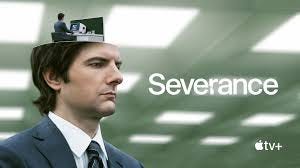Spoilers for the show Severance on Apple TV+.
A couple years ago, when we were in the thick of the pandemic, Ted Lasso came along and reminded us that kindness and vulnerability are not weakness. It gave us something wholesome to enjoy in the midst of fights about rights and freedoms, and in some ways, allowed us to think hard about what it might look like if people broadly, and men specifically, were to rethink what strength looks like. It was a balm at a time when a balm was desperately needed.
The new necessary show, Severance, is a lot less balm and a lot more bomb. It follows Mark S. (played brilliantly by Adam Scott) as a worker for Lumon Industries. He has undergone a procedure colloquially called severance where he has a device implanted in his brain that completely separates memories of his personal life from those of his work life. As a result, when in the basement of the building where he works, he has no past, no weekends, no life that is not his life at Lumon. For Mark, this is desirable because on the outside, his wife was killed in an automobile accident, and forgetting about that for 8 hours a day is preferable to dealing with his grief.
We are only three episodes in, but I am loving this show. It has serious Black Mirror meets DEVS vibes, and those have been some of my favorite watches over the past few years. But while those have been favorites because of their dark themes and near future tech, this is a favorite because I think it is speaking very directly to the time that we’re in.
The Great Resignation has been going on for a few years now, and is causing a number of people to rethink what work looks like for them. We’re seeing more persistent calls for fair wages as the minimum wage has remained the same since 2009. We’re seeing greater pushes for unions, after decades of decline in union membership. In the midst of this, we have seen the wealth of a very few at the top expand exponentially, while wringing their hands claiming “Nobody wants to work anymore!” when the reality is more likely that nobody wants to work for 0.001% of what their CEO is making.
And in the midst of this, along comes a television show that shows an extreme version of a company town. Lumon owns Mark’s home. They dictate where he goes to eat. They even control his brain. All under the guise of a healthy “work/life balance” mantra. At work, employees drink only Lumon branded coffee and eat Lumon branded snacks purchased with Lumon tokens. They are rewarded with erasers that don’t work, useless finger traps, and inane caricatures. When they step out of line, they are subjected to the “break room,” which seems to be a place designed to destroy any sense of self that may have made it through the elevator. And the employees must endure, as evenings, weekends, vacations, any shred of joy, are enjoyed only by their “outies.” All a severed employee experiences is unending work.
Obviously, this is an extreme scenario, one not likely to happen (though Elon Musk really wants inside our brains, so I will stop short of calling it impossible), but it also highlights how corporate America has hijacked our minds. How many people are expected to answer work emails from home? How many people are expected to work late without overtime? How many people are forced to be grateful for $11 an hour, despite that being a mere $22,880/year before taxes? Despite the frustration, most still accept these practices as normal.
Which brings me to my big hope for Severance. With only three episodes released so far, we still don’t know what the folks who have been severed are actually doing at Lumon. Dylan (Zach Cherry) suggests that whatever they’re doing must be to help mankind, otherwise why would they let a company mess around in their brains? Irving (as played by the incomparable John Turturro) believes they are merely removing swear words from movies. And I gotta be honest here, I really hope that’s the answer. Because that is what is truly frightening.
Most of the inequity that the American worker endures is not for some greater good. Amazon workers aren’t peeing in bottles so they can get a cure for cancer faster, but so we can get a bag of dog food faster. Video game developers aren’t crunching for 80 hours a week so they can bring about world peace, but so we can have a new skin in Fortnite.
This isn’t to say that all work has to be for the greater good in order to have value. What I don’t believe is that people should endure brutal working conditions to make my life a little bit easier or more enjoyable. The evil isn’t the product - the evil is the culture itself that pushes people to (and beyond) their limits to put a few more dollars in the pockets of the ultra rich.
So yes. My hope is that as we dig further into this story, the end result isn’t that the severed workers are creating some horrific weapon or bringing about the fall of democracy, but that it’s something mundane. Because if we want to really skewer corporate greed, the best way to do that is to show how banal what they’re producing is compared to the way they are producing it.
Now, tell your Amazon Echo (CEO net worth $179B) to play Apple’s (CEO net worth $2B) show on your LG television (CEO net worth $1.8 billion).




